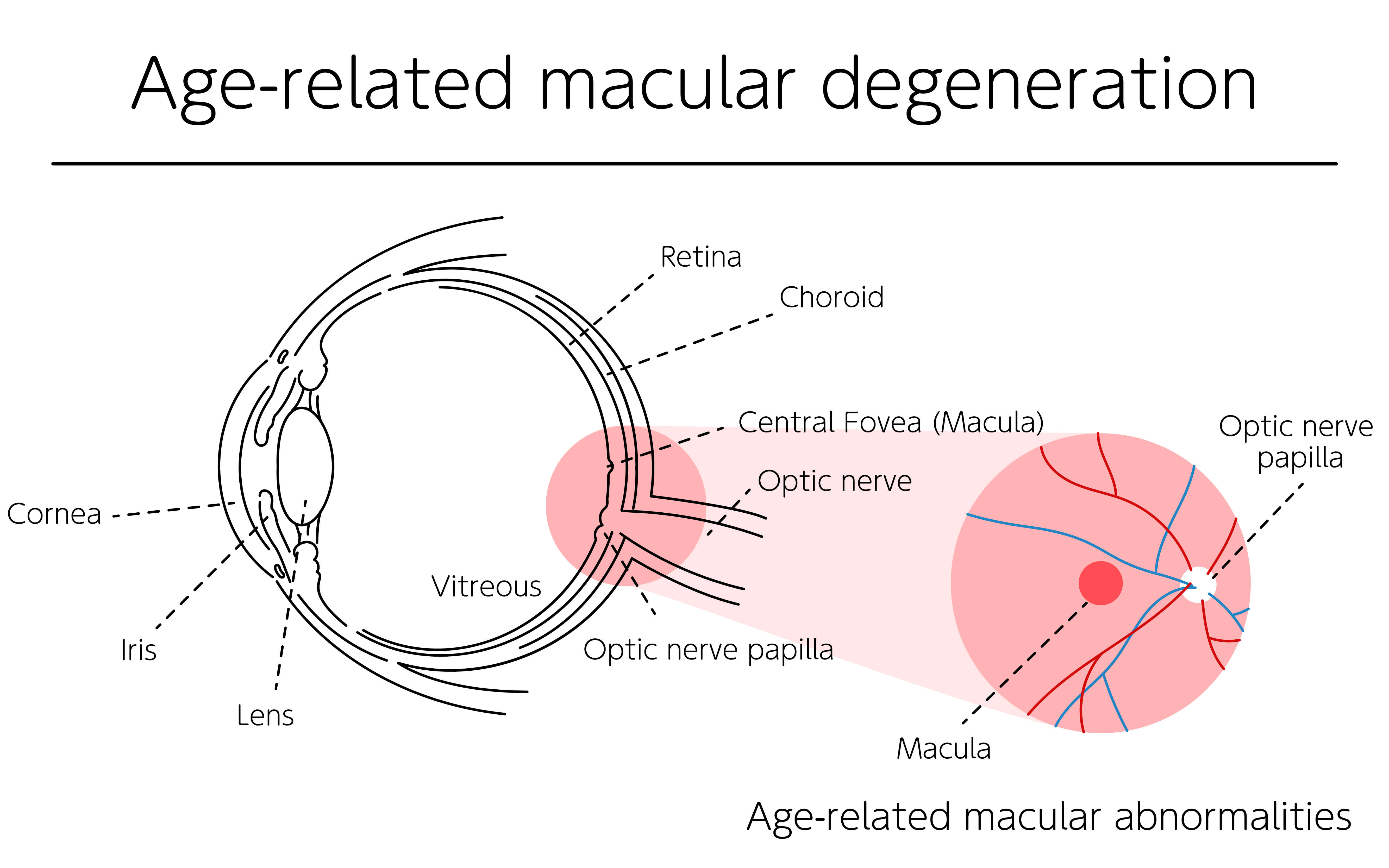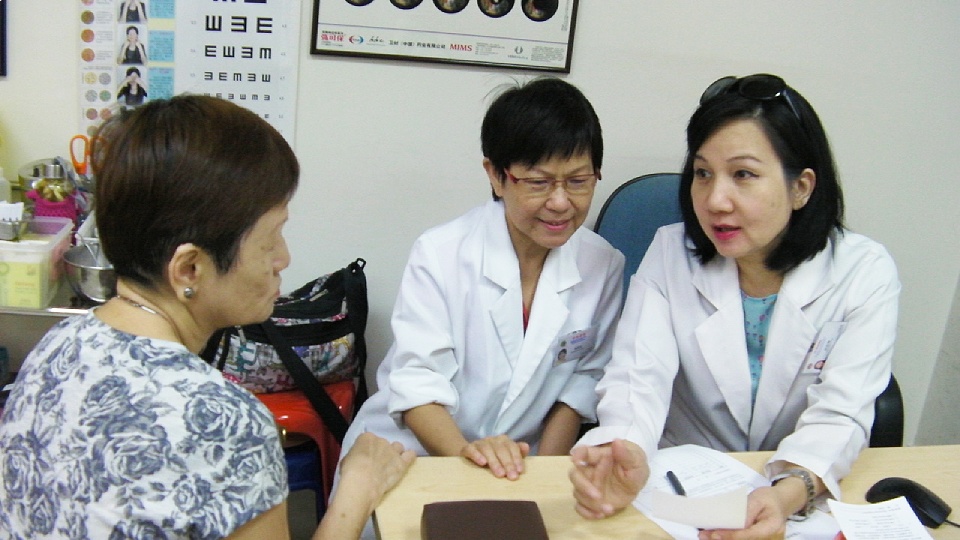How Traditional Chinese Medicine (TCM) Can Help With Age-Related Macular Degeneration
What is Age-Related Macular Degeneration?
Macular degeneration, also known as age-related macular degeneration (AMD) or 黄斑变性 in Chinese, is a disease that affects the eye, specifically the macula, which is a central part of your retina. The macula transmits images from the eye’s optic nerve to your brain and controls central vision.
AMD is a common, age-related condition that afflicts people over 50. This disease disturbs only central vision, not peripheral vision. Those suffering from AMD have difficulty seeing things directly ahead of them or fine details both in front of them and at a distance. While those with AMD are not completely blind, the condition can progress and result in legal blindness. Macular degeneration can affect one eye or both with differing levels of severity.
Types of Macular Degeneration
Dry Macular Degeneration (Dry AMD)
Also known as atrophic AMD, this condition occurs when drusen, which are yellow deposits, form under the retina, drying up and thinning the macula. This form of the disease is more common among those afflicted with AMD.
With dry macular degeneration, you will gradually lose your vision. Most do not completely lose their central vision, but dry AMD can progress into wet AMD in certain cases. There are three stages for dry AMD, and symptoms like vision loss may not be obvious until the latest stage of the disease, as it may advance slowly over many years.
|
Stage |
Symptoms |
|
Early |
There are changes to your macula, but your vision is not affected. |
|
Intermediate |
You may experience blurry vision or find it challenging to see in low-light situations. |
|
Late (Advanced) |
At this stage, your central vision will completely deteriorate. There is no cure available if you have late AMD in both eyes, but measures can be taken to protect your other eye if this condition only occurs in one eye. |
Wet Macular Degeneration (Wet AMD)
Also known as exudative or advanced neovascular AMD, wet macular degeneration is an advanced stage of dry macular degeneration. Any stage of dry AMD is at risk of progressing into wet AMD.
Less common but more severe than dry macular degeneration, this condition occurs when new, abnormal blood vessels grow under your retina and macula. Those vessels may leak blood or other fluids, which may accumulate and develop into a bulge, scarring your macula. You may have dark spots in the centre of your vision with wet macular degeneration, and it can lead to a quicker and complete loss of central vision.
Symptoms of Age-Related Macular Degeneration
With macular degeneration, the symptoms may not present themselves until the condition worsens. Many may not realise they are suffering from the disease until they experience blurry vision. Those who have AMD may also experience the following symptoms.
- Low vision
- Difficulty seeing in low light
- Colours appear less vivid or vibrant
- Straight lines appear wavy, curved, or crooked
- Blank or dark spots in your field of vision
- Blurred area (that may grow bigger) in the centre of your vision
Causes of Age-Related Macular Degeneration
While the exact cause of macular degeneration is not known, the following factors may contribute to the disease.
- Family history
- Ageing
- Diabetes
- Experiencing a head injury
- Having an infection
- Maintaining a diet lacking in nutrients
- An imbalance in your gut microbiome which aggravates inflammation, oxidative stress, and metabolic disorders
Complications
With this disease, you may find it difficult to do certain tasks such as reading, recognising faces, driving, cooking, and home repairs. You may feel a range of negative emotions from being unable to perform daily tasks, such as helplessness or frustration. If these feelings are exacerbated, they may even lead to depression or anxiety.
TCM Treatment for Age-Related Macular Degeneration
In Traditional Chinese Medicine (TCM) principles, central vision is more yin in nature, while peripheral vision is more yang. Hence, AMD can be seen as the burnout of the body’s yin. The loss of central vision, a symptom of AMD, signals the exhaustion of the kidney and liver’s yin. The insufficiency of yin can prompt a progressive dry stagnation of qi and blood, symptoms which are seen in the advanced stages of AMD.
While there is no cure for macular degeneration yet, TCM treatment can complement Western medicine to treat your underlying conditions and AMD by alleviating the symptoms and delaying its progression. TCM can help to cultivate the body’s yin and rejuvenate the body’s qi and blood.
Consultation
Before receiving TCM treatment for AMD, you need to be assessed and diagnosed by an ophthalmologist before you can be prescribed appropriate therapies. In certain cases, eye telemedicine with an eye specialist may be utilised for accurate diagnosis and treatment plans.
Acupuncture
Research up to now has shown that acupuncture may improve eye health. Eye acupuncture may boost microcirculation and help to remove fluid buildup and haemorrhaging in the macular region. Research also shows that eye acupuncture may be effective in relieving symptoms of wet macular degeneration. Furthermore, this treatment may work to decrease oxidative stress and improve inflammatory responses.
Chinese Herbal Medicine
Various Chinese herbs are useful in alleviating AMD symptoms by nourishing the body’s yin and helping to regulate your gut microbiome’s equilibrium. Herbs such as goji berry, chrysanthemum, ginseng, Poria mushroom (China root), Astragalus (also known as milkvetch or Huang qi), and bai zhu have anti-inflammatory influences.
Managing Macular Degeneration
Although there is no cure for macular degeneration, there are some ways to make living with the condition more manageable. You can wear eyeglasses or contact lenses, use brighter lights, and read with magnifying devices. Your doctor may also prescribe low-vision devices or vision rehabilitation to help you see better.
Treating AMD with TCM in Singapore
While living with macular degeneration in Singapore may be challenging, we are here to help. Contact us for a consultation, or to find out more about our TCM treatments and how they can help your condition.
Our TCM Specialist for Age-Related Macular Degeneration

Dr Pat Lim
- First to integrate Chinese medicine and Western medicine treatment in Ophthalmology in Singapore.
- Dr Pat Lim has graduated with a Diploma in Optometry with Singapore Polytechnic, and later pursued her Bachelor of Science in Optometry and Master of Science in Clinical Optometry with Pennsylvania College of Optometry, Salus University, USA and a Medical Doctorate degree in Western Medicine integrated with Chinese Medicine in Ophthalmology with Beijing University of Chinese Medicine.
- She has been in the practice for 25 years and specializes in using Chinese Medicine to treat eye diseases.

